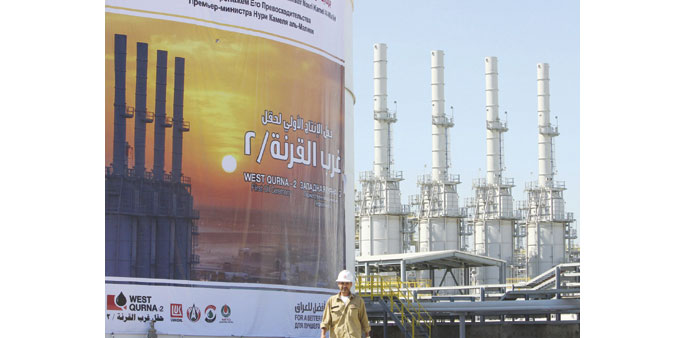A worker walks in West Qurna oilfield in Iraq’s southern province of Basra (file). Foreign oil companies have said they see little chance of a rise in Iraqi production this year or next after a request from Baghdad to slash development spending. The government has less money to pay them due to lower oil revenues.
Reuters
Basra
Iraq’s southern oil exports will rise modestly to around 3.25mn bpd in 2016, the head of state-owned South Oil Company (SOC) has said, as the country struggles to boost production in the face of slumping crude prices.
Shipments at the southern port of Basra, which include exports from supergiant fields supervised by SOC and other fields towards Baghdad, were at 3.021mn bpd in August, the latest period for which figures are available.
Foreign oil companies have said they see little chance of a rise in Iraqi production this year or next after a request from Baghdad to slash development spending. The government has less money to pay them due to lower oil revenues.
SOC head Hayan Abdulghani Abdulzahra told Reuters export growth in 2016 would rely on production increases in fields operated by those firms as well as state-owned companies.
“This increase will be in stages,” Abdulzahra said in an interview on Sunday, without providing a breakdown or timeline. “The export system is ready currently to export this figure or more.”
International firms such as BP, Royal Dutch Shell, ExxonMobil, Eni and Lukoil operate in the southern oilfields under service contracts, whereby they are paid a fixed dollar fee for production.
Those agreements have put Baghdad’s coffers under immense strain, as the halving of global oil prices since last year hammered the revenue it receives from selling oil.
Abdulzahra said SOC had not yet received the firms’ budgets for next year but expected to see them during the fourth quarter.
“We are waiting to receive them. As a pre-emptive step the ministry formed a committee to review these plans and budgets in the presence of representatives from South Oil Company,” he said.
Southern oil exports hit a record high of 3.064mn bpd in July following a decision by Iraq to split its crude stream into two grades, Basra Heavy and Basra Light, to resolve quality issues. Some companies working in Iraqi oilfields increased production following the move.
Abdulzahra said he expected exports of Basra Heavy to remain steady next year at around 850,000 bpd.
He also said production from southern oilfields around Basra, including Rumaila, developed by BP, is expected to rise by 250,000 bpd next year.
The southern oilfields, which account for more than 85% of production, are far from areas held by Islamic State militants in the north and west.
But lower oil prices and costs associated with the fight against the insurgents have strained Baghdad’s finances. A 2016 draft budget forecasts oil at $45 a barrel and average exports nationwide of 3.6mn bpd.
As the holder of the world’s fifth-biggest reserves, oil makes up around 40% of Iraq’s gross domestic product and more than 90% of fiscal and current external receipts.
The Opec producer has reduced its ambitious oil output growth targets, saying it would raise production to 5.5-6.0mn bpd by 2020.
Production seen at risk by Barclays as winter nears
Bloomberg
Dubai
Iraq’s oil production is at risk for winter when “loading problems” have historically reduced output by 300,000 to 500,000 barrels of crude a day, Barclays said.
Loading facilities and the nation’s single-point mooring systems are “insufficient for the winter season,” Michael Cohen, a Barclays analyst in New York, said in a September 25 report. It wasn’t clear from the report what causes the disruptions during winter.
Shipments from Basra in the south are sometimes slowed by strong winds during the first part of the year. In April, a four-mile (6.4-kilometre) line of supertankers was waiting to load the nation’s crude.
Opec’s second-largest crude producer has increased output this year as supplies from the south expanded even as Islamic State fighters occupied parts of the north. Iraq needs to keep increasing production because lower oil prices have curbed government revenue.
Crude output will increase by about 500,000 bpd to reach 4.5mn bpd by 2020, or 1.5mn barrels below the oil ministry’s target of 6mn barrels, according to Barclays. Production was 4.3mn bpd in August, the most in the Organisation of Petroleum Exporting Countries after Saudi Arabia, according to data compiled by Bloomberg.
Iraqi oil exports will rise to 3.7mn bpd in 2016 from 3.5mn this year, Barclays said. Shipments were 3.19mn barrels in June, a fourth consecutive monthly record, according to the International Energy Agency.

